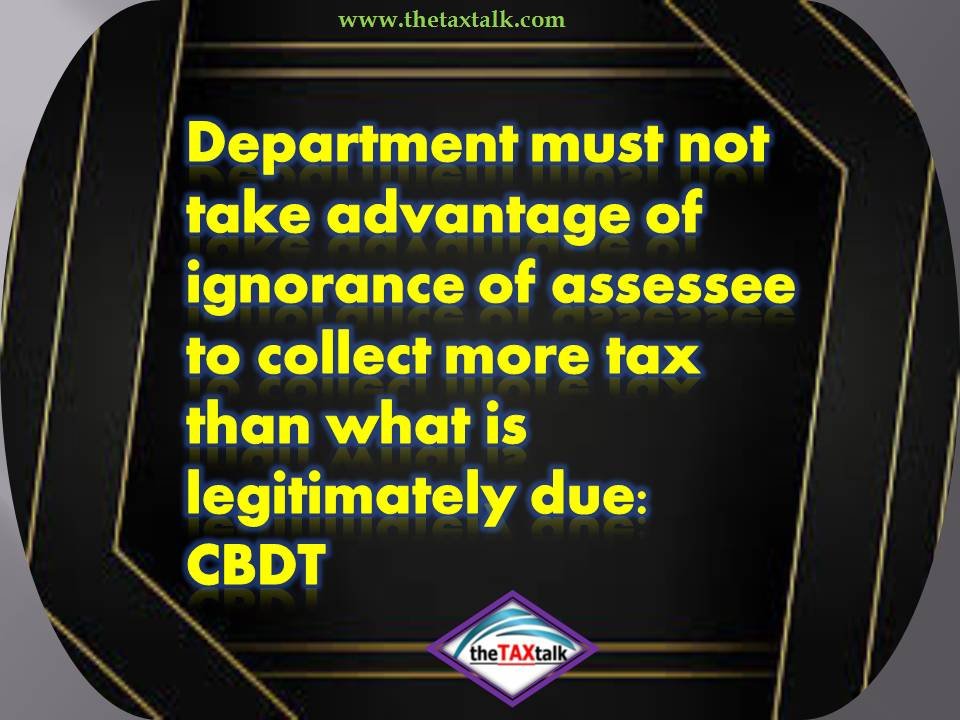![]()
Department must not take advantage of ignorance of assessee to collect more tax than what is legitimately due: CBDT
There is a landmark circular by the CBDT which was issued in the context of the 1922 Act. The circular is still relevant and can be used in all the present assessment proceedings as well.
The copy of the same is produced hereunder:
Central Board of Direct Taxes
Circular No. 14 (XL-35)
Miscellaneous—Refund and reliefs due to assessees—Departmental attitude towards
Dated: 11/04/1955
ASSESSMENT SECTIONS 143
- The Board have issued instructions from time to time in regard to the attitude which the Officers of the Department should adopt in dealing with assessees in matters affecting their interest and convenience. It appears that these instructions are not being uniformly followed.
- Complaints are still being received that while ITO’s are prompt in making assessments likely to result into demands and in effecting their recovery, they are lethargic and indifferent in granting refunds and giving reliefs due to assessees under the Act. Dilatoriness or indifference in dealing with refund claims (either under s. 48 or due to appellate, revisional, etc., orders) must be completely avoided so that the public may feel that the Government are actually prompt and careful in the matter of collecting taxes and granting refunds and giving reliefs.
- Officers of the Department must not take advantage of ignorance of an assessee as to his rights. It is one of their duties to assist a taxpayer in every reasonable way, particularly in the matter of claiming and securing reliefs and in this regard the Officers should take the initiative in guiding a taxpayer where proceedings or other particulars before them indicate that some refund or relief is due to him. This attitude would, in the long run, benefit the Department for it would inspire confidence in him that he may be sure of getting a square deal from the Department. Although, therefore, the responsibility for claiming refunds and reliefs rests with assessees on whom it is imposed by law, officers should:—
- (a) draw their attention to any refunds or reliefs to which they appear to be clearly entitled but which they have omitted to claim for some reason or other;
- (b) freely advise them when approached by them as to their rights and liabilities and as to the procedure to be adopted for claiming refunds and reliefs.
- Public Relations Officers have been appointed at important centres, but by the very nature of their duties, their field of activity is bound to be limited.
The following examples (which are by no means exhaustive) indicate the attitude which officers should adopt:—
- (a) Sec. 17(1) : While dealing with the assessment of a non-resident assessee the officer should bring to his notice that he may exercise the option to pay tax on his Indian income with reference to his total world income if it is to his advantage.
- (b) Sec. 18(3), (3A), (3B) and (3D) : The officer should in every appropriate case bring to the assessee’s notice the possibility of obtaining a certificate authorising deduction of income-tax at a rate less than the maximum or deduction of super tax at a rate lower than the flat rate, as the case may be.
- (c) Secs. 25(3) and 25(4) : The mandatory relief about exemption from tax must be granted whether claimed or not; the other relief about substitution, if not time barred, must be brought to the notice of a taxpayer.
- (d) Sec. 26A : The benefit to be obtained by registration should be explained in appropriate cases. Where an application for registration presented by a firm is found defective, the officer should point out the defect to it and give it an opportunity to present a proper application.
- (e) Sec. 33A : Cases in which the ITO or the Asstt. Commissioner thinks that an assessment should be revised, must be brought to the notice of the CIT.
- (f) Sec. 35 : Mistakes should be rectified as soon as they are discovered without waiting for an assessee to point them out.
- (g) Sec. 60(2) : Cases where relief can properly be given under this sub-section should be reported to the Board.
- While officers should, when requested, freely advise assessees the way in which entries should be made in various forms, they should not themselves make any in them on their behalf. Where such advice is given, it should be clearly explained to them that they are responsible for the entries made in any form and that they cannot be allowed to plead that they were made under official instructions. This equally applies to the Public Relation Officers.
- The intention of this circular is not that tax due should not be charged or that any favour should be shown to anybody in the matter of assessment, or that where investigations are called for, they should not be made. Whatever the legitimate tax it must be assessed and must be collected. The purpose of this circular is merely to emphasise that we should not take advantage of an Assessee’s ignorance to collect more tax out of him than is legitimately due from him

